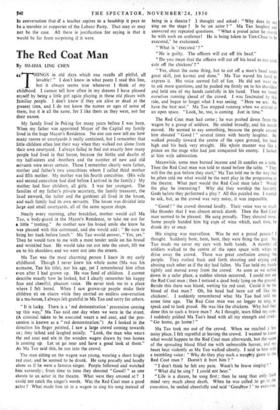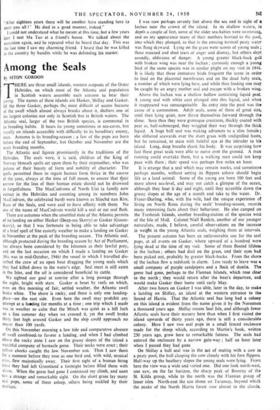The Red Coat Man
By SU-HUA LING CHEN 46PT1HJNGS in old days which one recalls all pitiful, all lovable! " I don't know in what poem I read this line, but it always seems true whenever I think of my childhood. I cannot tell how often in my dreams I have pleased myself by being a little girl again playing in those old places with familiar people. I don't know if they are alive or dead at the present time, and I do not know the names or ages of some of them, but it is all the same, for I like them as they were, not for their names.
My family lived in Peking for many years before I was born. When my father was appointed Mayor of the Capital my family lived in the huge Mayor's Residence. No one can now tell me how many rooms or courtyards it really contained, but I remember that little children often lost their way when they walked out alone from their own courtyard. I always failed to find out exactly how many people had lived in that house, because the births and deaths of my half-sisters and -brothers and the number of new and old servants were never certain. Those I remember clearly were father, mother and father's two concubines whom I called third mother and fifth mother. My mother was his fourth concubine. (His wife and second concubine had died before I arrived in the family.) My mother had four children, all girls.- I was her youngest. The families of my father's private secretary, the family treasurer, the head steward, the tailor and the gardener all lived in the house, and each family had its own servants. The house was divided into large and small courtyards, allof the same square shape.
Nearly every morning, after breakfast, mother would call Ma Tao, a body-guard in the Mayor's Residence, to take me out for • little "trotting." As mother saw his broad smile she knew he was pleased with this command, and she would add : "Be sure to bring her back before lunch." Ma Tao would answer, "Yes, yes." Then he would turn to me with a most tender smile on his broad and wrinkled face. He would take me out into the court, lift me on to his shoulders and we went out into the streets.
Ma Tao was the most charming person I knew in my early childhood. Though I never knew his whole name (Ma was his surname, Tao his title), nor his age, yet I remembered him often even after I had grown up. He was fond of children. I cannot describe exactly how he looked, but I clearly remember his happy face and cheerful, pleasant voice. He never took me to a place where I felt bored. When I saw grown-up people make their children sit on chairs while they carried on endless conversation in a tea-house, I always felt grateful to Ma Tao and sorry for others.
"It is lucky. There is a red demonstration' procession coming up this way," Ma Tao said one day when we were in the street. (A criminal taken to be executed wears a red coat, and the pro- cession is known as a "red demonstration.") As I looked in the direction his finger pointed, I saw a large crowd coming towards us ; they talked and laughed noisily. "Look, the man who wears the red coat and sits in the wooden wagon drawn by two horses is coming up. Let us go near and have a good look at them." As Ma Tao said this, he ran into the crowd.
The man sitting on the wagon was young, wearing a short bright red coat, and he seemed to be drunk. He sang proudly and loudly alone as if he were a famous singer. People followed and watched him earnestly ; from time to time they shouted "Good! " as one shouts to an actor in the theatre. What were they amused at ? I could not catch the singer's words. Was the Red Coat man a good taetor ? What made him sit in a wagon to sing his song instead of being in a theatre ? I thought and asked : "Why does he net sing on the stage ? Is be -an actor ? " Ma Tao laughed and answered my repeated questions. "What i proud actor he should be with such an audience! He is being taken to Tien-Chao to be executed," he exclaimed.
"What is ' eiecuted ' ? "
"He is guilty. The officers will cut off his head."
"Do you mean that the officers will cut off his head as our cook cuts off the chickens'?"
"Yes, about the same thing, but to cut off a man's head needs great skill, just ku-tsai and done." Ma Tao waved his hand in express it. His voice seemed full of fun. He did not want me to ask more questions, and he pushed me firmly on to his shoulders and held one bf my hands carefully in his hand. Then we found Ourselves running ahead of the crowd. I was fascinated by this ride, and began to forget what I was seeing. "Here we are. We have the best seat." Ma Tao stopped running when we arrived at an open space., "Look, he, too, is coming. Just in time."
The Red Coat man had come ; he was pushed down from the wagon by a group of soldiers. He smiled broadly, and his mouth moved. He seemed to say something, because the people around him shouted " Good ! " several times with hearty laughter. He walked proudly toward the centre of the open ground, his head high and his back very straight. His whole manner was like a prince on the stage who had just conquered his enemy. I looked at him with admiration.
Meanwhile, some men burned incense and lit candles on a table, Then the Red Coat man was told to stand before the table. "They will fire the gun before they start," Ma Tao told me in the way that he pften told me what would be the next play in the programme at the theatre. What part would the Red Coat man take ? Would the play be interesting ? Why did they worship the heavenly Gods before they performed a play ? All this puzzled me. I wanted to ask, but, as the crowd was very noisy, it was impossible.
" Good I" the crowd shouted loudly. Their voice was so much like thunder that I was almost-struck dumb. - Then the Red Coat man seemed to be pleased. He sang proudly. They shouted more. Some people handed him big cups of wine which, each time, he drank dry at once.
His singing was marvellous. Was he not a proud person ? I thought. Suddenly born, born, born, they were firing the gun. Ma Tao made me cover my ears with both hands. A number of soldiers walked to the centre of the open space with whips ta drive away the crowd. There was great confusion among the people. They •rushed back and forth shouting and crying and abusing each other as if the sky had fallen. Ma Tao held my hands tightly and moved away from the crowd. As soon as we settled down in a safer place, a sudden silence occurred. I could not see the Red Coat man ; then I noticed a dead body lying on the ground. Beside this there was blood, wetting his red coat. Could it be the blood of that man ? Oh, his head had been cut off like the chickens'. I suddenly remembered what Ma Tao had told me some time ago. The Red Coat man was no logger to sing, to speak and to look proud. He was like the chickens. Why had they done this to such a brave man ? As I thought, tears filled my eyes. I suddenly pushed Ma Tao's head with all my strength and cried: "Go home, go home ! "
Ma Tao took me out of the crowd. When we reached a less noisy Place, I felt regretful at leaving the crowd. I wanted to know what would happen to the Red Coat man afterwards, but the scene of the spreading blood filled me with unbearable horror, and my heart beat violently as Ma Tao walked silently. I said to him with a trembling voice: "Why do they play such a naughty game to the Red Coat man ? Doesn't it hurt him ? "
"I don't think he felt any pain. Wasn't he brave singing ?" "What did he sing ? Lcould not hear."
"Life is a dream, he sang first;- then he sang that only
fools
mind very much about death. When he was called to go to the execution, he smiled cheerfully and said Gooilbye ! ' to everyone. 'After eighteen years there will be another hero standing here to meet you all ! ' He died in a good manner, indeed."
I could not understand what he meant at this time, but a few years later I met Ma Tao at a friend's house. We talked about the execution again, and he repeated what he heard that day. This was the last time I saw my charming friend. I heard that he- was killed in the country by bandits while he was defending his master.















































































 Previous page
Previous page